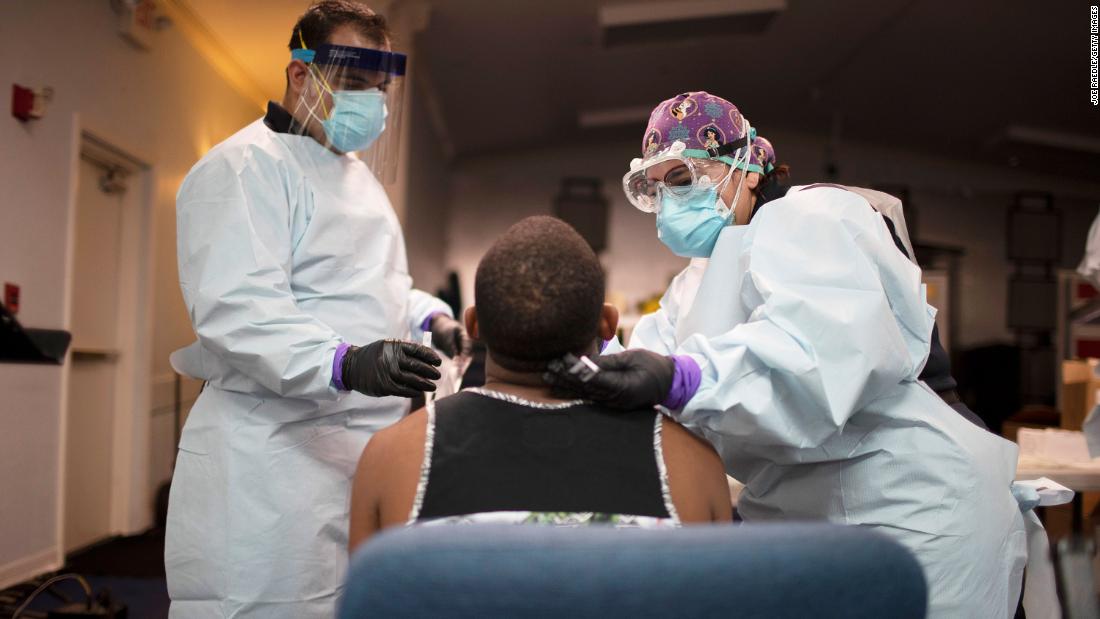These variables affect how you fare in the pandemic
begin quote from:Covid-19 data confirms what experts have suspected about what influences whether you live, die or get help
 Health care workers use a nasal swab to test a man for Covid-19 at a pop-up testing site on July 22 in Pembroke Park, Florida.
Health care workers use a nasal swab to test a man for Covid-19 at a pop-up testing site on July 22 in Pembroke Park, Florida.

Health care workers use a nasal swab to test a man for Covid-19 at a pop-up testing site on July 22 in Pembroke Park, Florida.
These variables affect whether you live, die or get help during the pandemic
Updated 12:49 PM ET, Thu August 20, 2020
(CNN)As the US continues to grapple with the dual crises of coronavirus and racism, two things have become clear: People of color are being hit hardest by the virus, and systemic inequities are largely to blame.
Eight months into the pandemic, race and ethnicity data on Covid-19 now paint a more complete picture than before. The numbers are stark, confirming what experts and minority communities have long suspected.
Black, Latino and Native American people are nearly three times as likely to be infected with Covid-19 than their White counterparts. Those three groups are about five times as likely to be hospitalized. And people of color across the board are more likely to die of the virus.
The statistics are no coincidence: Public health officials have long known that systemic racism is a public health issue. But the coronavirus pandemic, set against a national reckoning on race since the killing of George Floyd, has amplified the problem.
"What Covid-19 does is actually shine a light on a problem that was already there," said Dr. Lisa Cooper, director of the Johns Hopkins Center for Health Equity.
Race affects who is able to flee from a viral hotspot to a second home and who shares a roof with family members across generations. It affects who is able to work remotely and who has to leave home to keep society afloat. It affects who has easy access to testing and who puts off treatment because they're worried about the costs.
In other words, as the US approaches six million confirmed coronavirus cases, race plays a major role in who lives, who dies and who gets help.
Updated 12:49 PM ET, Thu August 20, 2020
(CNN)As the US continues to grapple with the dual crises of coronavirus and racism, two things have become clear: People of color are being hit hardest by the virus, and systemic inequities are largely to blame.
Eight months into the pandemic, race and ethnicity data on Covid-19 now paint a more complete picture than before. The numbers are stark, confirming what experts and minority communities have long suspected.
Black, Latino and Native American people are nearly three times as likely to be infected with Covid-19 than their White counterparts. Those three groups are about five times as likely to be hospitalized. And people of color across the board are more likely to die of the virus.
The statistics are no coincidence: Public health officials have long known that systemic racism is a public health issue. But the coronavirus pandemic, set against a national reckoning on race since the killing of George Floyd, has amplified the problem.
"What Covid-19 does is actually shine a light on a problem that was already there," said Dr. Lisa Cooper, director of the Johns Hopkins Center for Health Equity.
Race affects who is able to flee from a viral hotspot to a second home and who shares a roof with family members across generations. It affects who is able to work remotely and who has to leave home to keep society afloat. It affects who has easy access to testing and who puts off treatment because they're worried about the costs.
In other words, as the US approaches six million confirmed coronavirus cases, race plays a major role in who lives, who dies and who gets help.










No comments:
Post a Comment